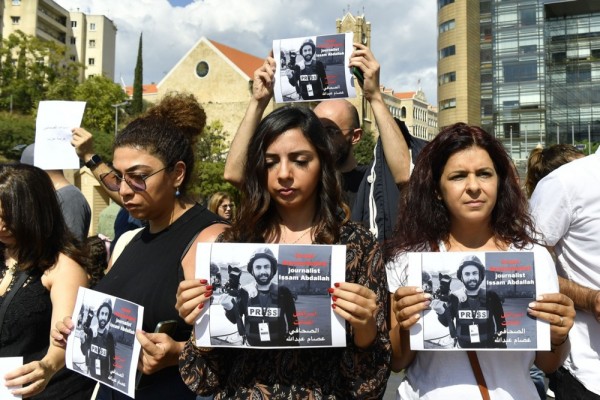Lebanese journalist and former television anchor for the Lebanese Broadcasting Corporation (LBC) May Chidiac, one of 60 “IPI World Press Freedom Heroes” honoured by the International Press Institute, spoke to Laura Pannasch at the IPI World Congress 2010 in Vienna. Even an assassination attempt in September 2005, in which she lost part of her left leg and left arm, did not deter her from expressing her opinion on sensitive Middle East issues.
LP: Do you remember the moment when you heard that you were to be honoured as an IPI World Press Freedom Hero by the International Press Institute? How did you feel?
MC: It was two days after I participated in an event in Lebanon, at which there was a ceremony, and they asked me to give a speech. I was one among many who participated and gave speeches on that occasion. During my speech, the representatives of two big responsible men in Lebanon – the President of the Republic and the head-speaker – asked other representatives to withdraw from the audience because they were not pleased with what I said.
So I was really frustrated. It is incredible, what is going on in my country. After everything I went through and suffered from, the killing attempt and the loss of two of my limbs – my hand and my leg – and after forcing me in one way or another to quit my job as a TV talk show moderator, they are insisting on silencing me. I really felt bad, you know. On such an occasion you feel really desperate.
So two days later, at the end of March 2010, when I received a phone call from the IPI, telling me that I had been chosen as a worldwide hero because of journalism, I felt like some sort of light coming from above. This light seemed to be telling me that there is always an angel, protecting me, as well as showing me that injustice cannot always prevail. I think there will always be a light coming from somewhere to prove to me that everything I have said and done is right. This is why the prize from IPI was a big symbol to me. I really appreciate this prize the most – because I received lately many awards – but this one means a lot to me because of the circumstances.
LP: There are still just a few participants from Arab countries at the IPI Congress. Do you think that this mirrors the lack of democracy and free speech?
MC: Yes, of course! If you have an IPI report criticising the lack of freedom of speech in an Arab country, that means the authorities will not be satisfied with such reports. Maybe some people participating in such conferences will be forbidden from returning and resuming their work back home under normal conditions. Consequently, not many are willing to lose their jobs or not many have the ability to be solid enough to defeat their authorities and to come here. This is why I think it is paralysing the participation of the Arab world’s journalists. In Lebanon for example, you can say whatever you want, but in the end they will make you pay the price [laughs]. This is why you find many Lebanese here, expressing themselves, but God knows what will be the price! We have a saying: In Lebanon there is a lot of freedom, but not much democracy [laughs].
LP: What role does your family, especially your sister, play in your life? [Note: May Chidiac’s sister Misha Baaklini and niece May Baaklini accompanied her to the IPI World Congress.]
MC: My family played a big role enabling me to continue my life after the bomb attack. My biggest problem is that I lost my independence. In Lebanon I can ask people to help me but you cannot have another May. My head is still functioning as quickly as before but now I need people to understand me, to do things I used to do on my own. So it is not easy. When travelling, not only my sister accompanies me, I also have eight nephews and nieces. One of them is here with me.
In Lebanon I also have my mother and my other sister. If they were not there, I can assure you, my life would have been misery even though I have been fighting all the time. I cannot be on my own anymore. The problem is: when you lose a hand and a leg, you can wear a leg prosthesis, but my leg is amputated above the knee, which is terrible. I have an electrical knee but you need two hands to put on your leg prosthesis and I have only one. I also cannot move with a normal wheelchair, because you need two hands. So this is why I always have special requests. For example, I asked the IPI delegation to prepare an electrical wheelchair for me because otherwise I would need somebody to push me all the time and I hate it. [Pause]
Sometimes I am really fed up.
*Please note: The views expressed in this article are those of the author, and do not necessarily reflect those of the International Press Institute (IPI)


